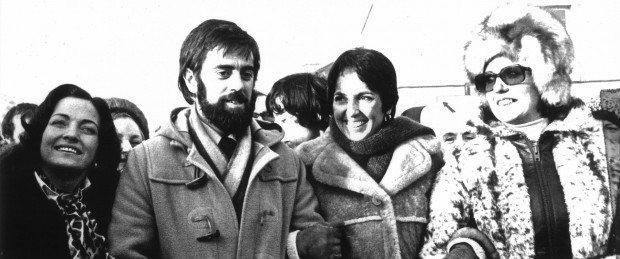11 August 2016
The Peace People – A weapon in Britain’s propaganda war

● Mairead Maguire, Ciarán McKeown, singer Joan Baez and Betty Williams
IN MID-AUGUST 1976, IRA Volunteer Danny Lennon was shot dead by the British Army as he drove through Andersonstown in west Belfast. The car ran out of control and mounted the pavement, where it struck and killed the three young children of Anne Maguire, a local resident.
The following day, the aunt of the children killed, Mairead Corrigan, and Betty Williams established the Women’s Peace Movement, later called ‘The Peace People’. They were later joined by Ciarán McKeown, the Northern Editor of the Irish Press newspaper.
Three days later, the first rally was attended by 1,000 women in west Belfast and called for a “just and peaceful society”. It was followed by a number of marches during the autumn months and attracted women from loyalist and nationalist areas of Belfast.
While many members of the nationalist and loyalist communities, some no doubt war-weary after years of conflict, had a genuine desire for peace with justice, they were exploited and manipulated by individuals who were pursuing their own political agenda and by the British Government and the British media.
From the beginning, and despite the circumstances that led to its foundation, the Peace People movement was directed almost solely at the IRA and ignored British state violence against nationalists in the Six Counties.
The initial euphoria which greeted the campaign soon evaporated and the movement began to disintegrate.
In October 1977, the Peace People lost all credibility when Corrigan and Williams, awarded the Nobel Peace Prize for 1976, surprised and angered supporters when Betty Williams kept some of the cash prize for personal use.
Support for the Peace People declined dramatically, rallies ceased and the movement was exposed to the nationalist population as an anti-republican front.
During the following years, the Peace People publicly denounced the IRA campaign in the Six Counties, the most vociferous critics being Corrigan and Williams. They failed, however, to speak out against the widespread violence and use of plastic bullets by the British Army and RUC, which killed and maimed nationalists, many of them young children, and the daily harassment of nationalists.
In February 1980, members of the organisation’s executive disagreed over whether to support the republican prisoners on a blanket protest in the H-Blocks of Long Kesh. One of the co-founders, Williams, resigned “for family reasons”. The following month, a former chairperson, Peter McLachlan, also left.
After a controversial four years of existence, particularly with its failure to support the 1980 and 1981 Hunger Strikes in Long Kesh – the Peace People was by the early 1980s effectively a paper organisation.
The Peace People organisation was founded on 11 August 1976.
Follow us on Facebook
An Phoblacht on Twitter
Uncomfortable Conversations

An initiative for dialogue
for reconciliation
— — — — — — —
Contributions from key figures in the churches, academia and wider civic society as well as senior republican figures




